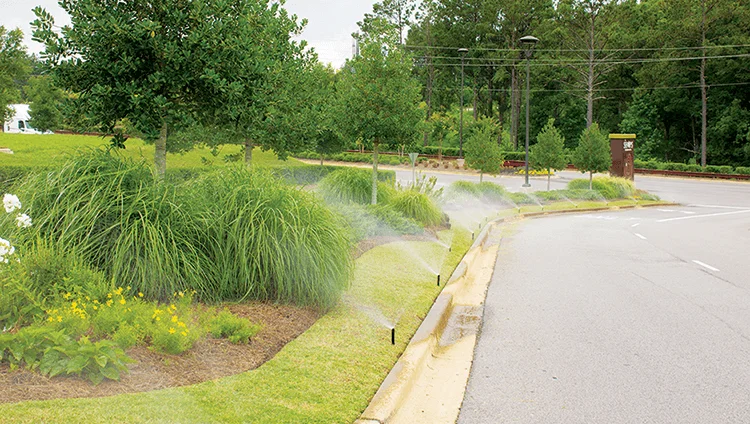The Best Time to Water Grass

When is the best time to water grass?
The best time to water grass is early in the morning, between 6 a.m. and 10 a.m., as the cooler air and calmer breezes allow water droplets to reach the grass roots before evaporating. Watering during this period helps in preventing wasteful evaporation and the risk of lawn diseases associated with nighttime watering. Additionally, most lawns require 1 to 1.5 inches of water per week, either from rain or manual watering, which can be applied during a single session or divided into two sessions throughout the week. Following this schedule ensures optimal soil soaking and promotes healthy grass growth without overwatering.
Why is the morning the best time to water grass?
With high temperatures in the summer months, keeping your lawn green and healthy can be a challenge and watering is key to maintaining that vibrant lawn. However, a proper watering strategy is crucial, including the time you water, how much you water, and a variety of other factors.
With that said, the answer to this question is simple – the morning is the best time to water your lawn because the air is cooler and your lawn is still wet from dew. By watering in the morning, you’ll avoid some of the rapid evaporation that would happen later in the day as the sun comes out and temperatures rise. This gives the lawn… time to absorb the water in the soil and reach the root zone.
Watering your lawn early in the morning is tremendously better than watering it at night, for completely opposite reasons. While watering during the day causes water to evaporate too quickly, watering in the evening allows water to cling to the grass for too long. Overnight, the water will continue to rest in the soil, around the roots, and on top the foliage, which will encourage it to rot, develop fungus, and attract insects.
How often should I water my lawn and how do I know if it needs to be watered?
It may come as a surprise that more plants are actually killed through over-watering than under-watering. The key to proper watering is to water deeply and infrequently. What this means is when you water your lawn, you want the water to soak deep down into the soil in order to reach the roots. When water is absorbed at this level, it will retain in the soil and you will not need to water the lawn every day. Watering on a daily basis is not beneficial to your lawn. Too much water can be just as damaging to plants as too little water and the excessive irrigation will invite future disease problems.
Dry soil is an indicator that the lawn needs more water. If the soil is dry, it is dehydrated and needs water. If the soil is moist, there is no need to irrigate. A simple test is to walk across the lawn. If the grass blades spring back, hold off on watering. If you can see your footprints, the soil is most likely dehydrated. Your goal is for the lawn to receive enough water to keep the soil slightly moist in the upper six inches of soil. This usually requires at least one inch of water per watering session or around 30 minutes of watering, however, each lawn is different.
Do I still water my lawn if it rains?
When scheduling your watering frequency, it’s very important to take into account upcoming rainfall. Do not water your lawn if heavy rains are expected soon, and if you use an automatic watering system, be sure to update the system’s preferences around days expected to have heavy rain. Keep in mind this is for heavy rainfall when the water will be able to soak into the soil and reach the roots. Sprinkling or a light supply of rainfall will not provide enough water for your lawn and you should continue to water as planned.
What about the other plants on my property?
If your lawn has other landscaping elements such as trees, shrubs, and flowers, be sure to understand their watering requirements. While some plants need to be watered daily, others will only need a couple of waterings per week. A plant’s age also determines how often you need to water it. Young, newly planted landscaping requires more water to establish and grow a strong root system. On the other hand, mature, established plants don’t need to be watered as often. Instead, like your lawn, they will need a large amount of water at one time so that their roots can maintain good health deep in the ground.
What is the best way to water my lawn?
Unless you want to get up before the sun rises to water your lawn, we advise getting a watering system installed. On top of letting you get extra sleep, choosing and operating a watering system correctly can also reduce water bills, insect and disease problems, and maintenance requirements. Also, keep in mind that certain landscape elements, such as flowers and potted plants, may require more attention and water than your irrigation system will be scheduled to provide for the lawn.
Watering your lawn correctly during the summer months is crucial and sets up your lawn’s health for the remainder of the year. While figuring out what the proper amount of water is for your lawn is feasible, we highly recommend having a landscape professional come out and inspect your property. They can help you determine the best watering frequency plan for your property’s specific needs, including the lawn and other landscape elements that may require different watering patterns. Landscape professionals can also install and maintain your irrigation systems for you.
While water is crucial to the health of all landscaping, it needs to be applied correctly. If you think your property is not being watered correctly or you have general questions about watering frequency, contact us! We’d love to help you find a solution for your specific needs and improve the overall health of your property.

























